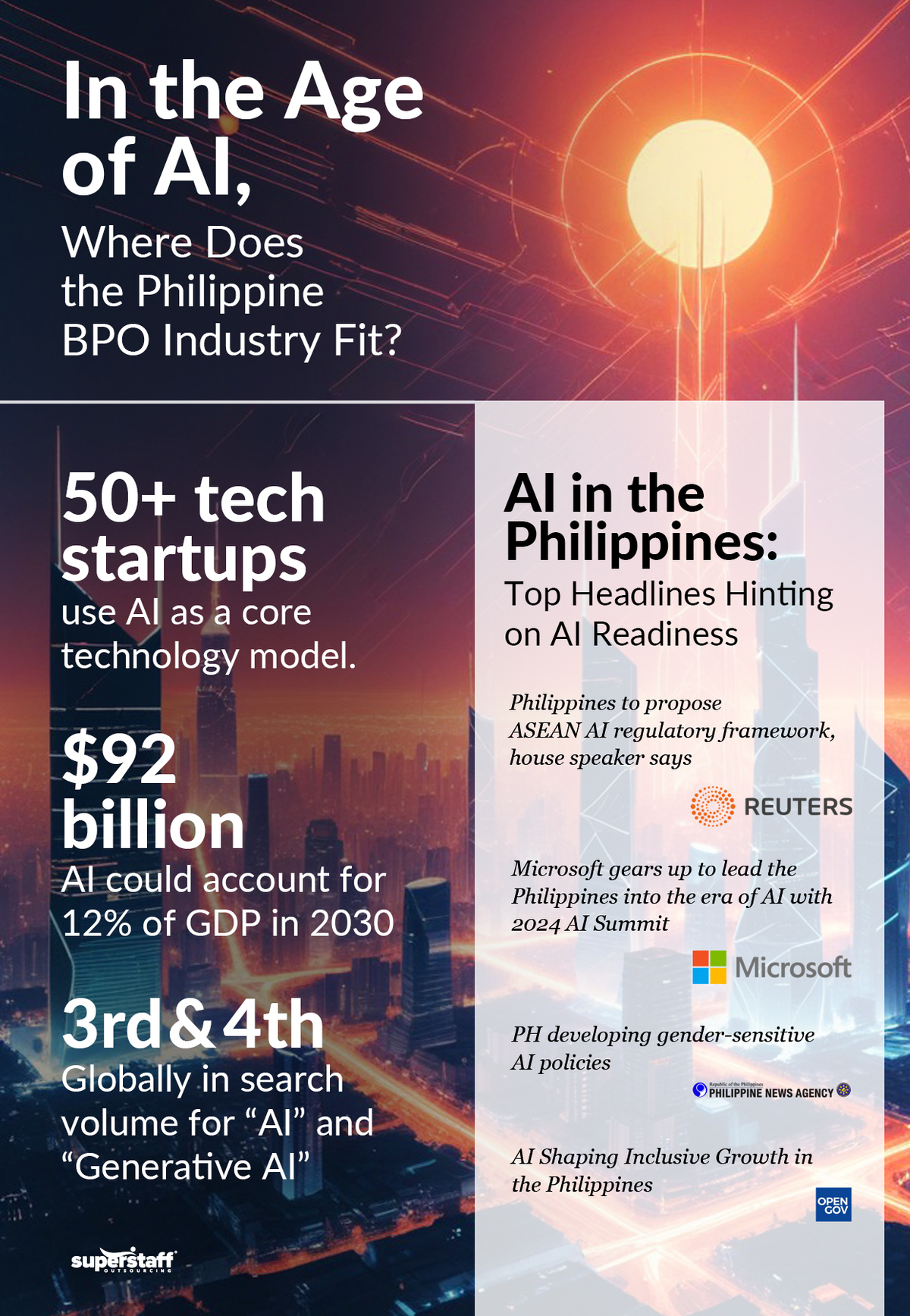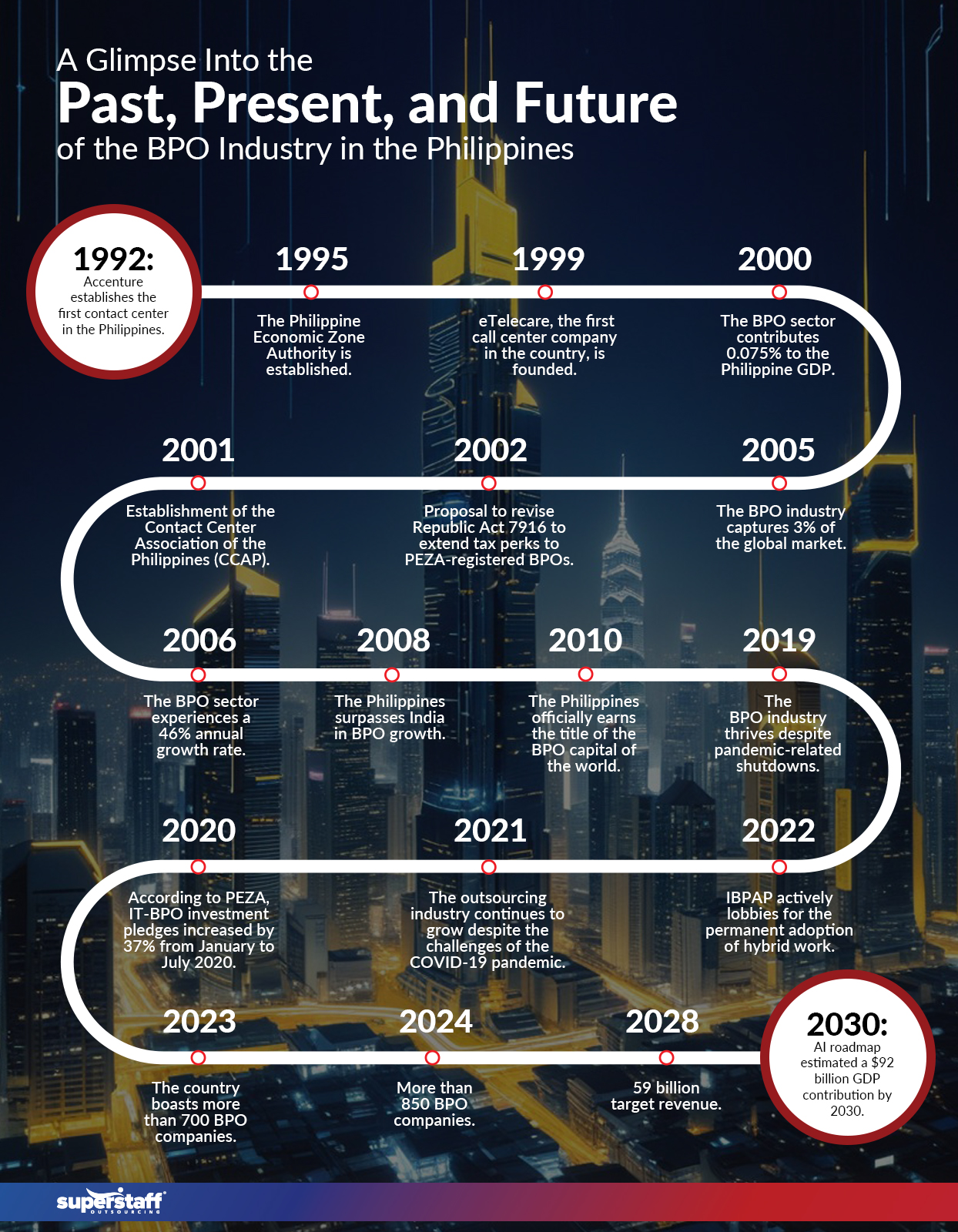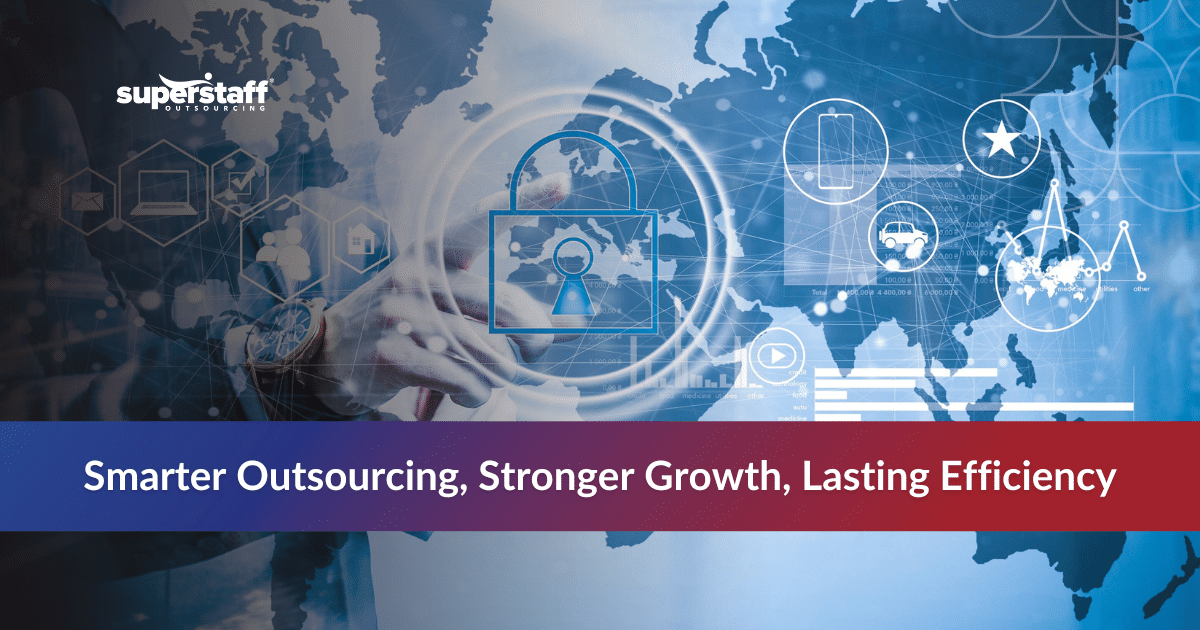
With artificial intelligence (AI) creating waves globally, most employees and company leaders are excited and anxious about the future of the workplace. This new advancement has the opportunity to revolutionize the business sector, but it also comes with its fair share of risks and challenges.
To give you a taste of how the business process outsourcing (BPO) sector fits in the Age of AI, let’s zoom in on the Philippines, the so-called “Call Center Destination of the World.”
We’ll examine the past and present state of the BPO industry in the Philippines to help you fully appreciate its growth and success. Then, we’ll look forward and give you a glimpse into the promising future for local BPO companies in the AI Age.
In the Age of AI, Where Does the BPO Industry in the Philippines Industry Fit?
According to the Information Technology and Business Process Association of the Philippines (IBPAP), the country’s BPO sector is not only surviving but actively thriving amid the global business world’s push for more robust AI adoption.
Industry experts predict the local information technology and business process management (IT-BPM) industry will hit $59 billion in revenue by 2030. The sector is also pivotal in generating jobs for Filipinos, with BPO companies employing over 2.5 million full-time workers in the same period.
Embracing the AI Revolution to Further Philippine Call Centers’ Competitiveness
This ambitious target aligns with the industry’s adoption of AI. In September 2022, the government released its artificial intelligence roadmap, which describes how businesses can harness AI’s capabilities to maximize their industry’s potential, uplift the local economy, and create opportunities for Filipino talent.
Philippine call centers will likely be among the pioneers of AI adoption in the local business community. BPO companies have planted the seeds for future growth by investing in cutting-edge IT infrastructure, prioritizing workforce training and upskilling, and offering AI and ML development support solutions.
Indeed, the future looks bright for the Philippine BPO industry. An EDBI report emphasized the immense value of artificial intelligence for Southeast Asian countries, estimating that its adoption could add $1 trillion to the region’s gross domestic product (GDP) in as quickly as six years.
The Right Talent + The Right Skills in the AI Era
Let’s examine the latest news stories and headlines to understand better how the Philippine outsourcing industry plans to use AI solutions to its advantage. Local call centers embrace the idea of blending human excellence with automation and innovation.
Ushering a New Era of Innovation With Microsoft’s AI Summit 2024
Microsoft Philippines continues to be a leading voice in artificial intelligence adoption in the country. In January 2024, the tech company launched its AI Summit 2024, where it introduced significant AI developments and innovations to over 350 public and private sector leaders across the country.
One such advancement is the Microsoft Copilot software. This generative AI tool aims to transform workplace productivity by reducing employees’ time on repetitive tasks like searching for information, writing code, and analyzing data. Their research found that 70% of users reported higher productivity, 68% noticed improvements in their work quality, and 77% didn’t wish to stop using the tool.
The company invited fellow organizations and industry veterans to share their insights on AI’s real-world business applications and advantages. Some attendees included leaders from powerhouse local companies such as BDO Unibank, the Asian Development Bank (ADB), SoftwareONE, and Security Bank. Another notable attendee is Inspiro, a call center in the Philippines.
The Philippines Leads the Charge in Creating the ASEAN AI Regulatory Framework
Among Southeast Asian countries, the Philippines is positioning itself as a pioneer of AI adoption. The country leads the charge in proposing a region-wide regulatory framework for optimizing new developments while navigating complex issues such as intellectual property, misinformation, censorship, and other tricky topics.
During the World Economic Forum (WEF) in Davos, the Philippines’ House Speaker Martin Romualdez announced the nation’s plan to present a legal framework for AI to the Association of Southeast Asian Nations (ASEAN) by 2026.
The regulatory framework will be based on the Philippines’ draft legislation, which showcases the country’s commitment to furthering digital transformation while acknowledging potential ethical and societal considerations.
To further strengthen international relations, the Philippine government also hopes to leverage AI for diplomacy. Although these initiatives are still in their early stages, local diplomats see AI’s potential in helping strengthen global relationships by using descriptive analytics to detect international trends, simplify decision-making processes, and personalize how they approach different country leaders.
Transforming the Philippines Into a Global Hub for AI and Innovation
The Philippine government has been making significant strides in adopting artificial intelligence, potentially positioning the country as a global hub for innovation. In a roundtable discussion in San Francisco, the Philippines’ current President, Ferdinand R. Marcos Jr., even highlighted the country’s readiness to embrace AI and innovation.
Recognizing the massive benefits of investing in technology, the local government launched the Philippine Innovation Act (Republic Act No. 11293) in 2019. This bill aimed to develop a National Innovation Council, which will lead the way in formulating a countrywide strategy aiming to utilize innovative technologies for sustainable development and economic growth.
Another notable government initiative is the Philippine Innovative Startup Act (R.A. 11337), which provides favorable incentives and financial benefits for innovative startups in the country. This way, emerging tech and AI entrepreneurs can gain the support they need to thrive in the local business environment.
Finally, the Philippines hopes to establish a National Center for A.I. Research (N-CAIR) to support AI development and digital transformation for local organizations. This center is also set to become the premier research hub in the ASEAN region, driving innovation in sectors such as banking, real estate, manufacturing, healthcare, and more.
Industry experts are excited about AI’s transformative impact on the Philippines’ customer service outsourcing and business landscape. This technological advancement has the potential to shape inclusive growth in the country by driving all industries to maximum productivity and innovation.
Navigating AI’s Social and Ethical Considerations
As mentioned in previous sections, the Philippines is eager to adopt AI solutions to increase global competitiveness and uplift its local economy. However, leaders from both public and private sectors are also careful to navigate the societal and ethical impact of embracing AI.
The University of the Philippines (UP), one of the country’s top higher education institutions, has released principles for the responsible use of AI in business, education, and national development.
UP reminds organizations and individuals to uphold privacy and data protection standards when using AI, implement measures to hold relevant stakeholders accountable for potential outcomes and ensure that AI systems are developed for the common good of the Filipino people.
Beyond these principles, the Department of Science and Technology (DOST) also plans to use AI development to advance gender equality initiatives in the country. The Philippines hopes to develop and execute programs that train women in AI, data science, and other Science, Technology, and Mathematics (STEM) fields.
The Bottom Line: AI Is Here To Stay
All of these developments highlight the inescapable truth: The Philippines recognizes that AI is here to stay, and multiple local sectors are working hard to leverage the innovation to their advantage.
Now that we’ve seen the bigger picture, let’s zoom into one particular sector: the BPO industry. How will the emergence of artificial intelligence impact one of the country’s top revenue generators, and how will call centers outsourcing in the Philippines evolve to meet the challenges of the AI Age? Let’s find out.
Stronger in the AI Age: Economic Outlook of the Philippine Outsourcing Industry

The call center industry is an economic pillar for the Philippines. Even amid global challenges and disruptions, the sector is projected to contribute $32 billion to the country this year, a 9% increase in revenue.
As rising wages and inflationary pressures squeeze businesses in the United States, more companies will seek to relieve the tension by turning to the Philippine BPO industry.
For decades, the Philippines has been the go-to destination for North American companies seeking a cost-effective yet high-quality workforce. Still, this alliance is about to strengthen even further.
Industry experts project that the Philippines’ economy will grow 6% in 2024, owing 8% of its economic output to the outsourcing sector. To meet this rising demand, the local BPO industry seeks to add 1 million more jobs by 2028.
Fastest-Growing Southeast Asian Economy
According to a McKinsey study, the Philippine economy has displayed remarkable resilience despite various global pressures. In 2023, it became the fastest-growing economy in the Southeast Asian region. The researchers predict the country’s GDP will increase between 5% and 6% this year.
Although the Philippines owes much of its economic development to the outsourcing industry, the nation also benefited from the continued growth of multiple sectors. The same McKinsey research highlighted financial services, energy and power, manufacturing, and information technology (IT) as among the top sectors with a positive economic outlook in 2024.
Robust Financial Stability
In addition to having a fast-growing economy, the Philippines’ Department of Finance showcased the country’s solid financial stability in its 2023 report. Among the ASEAN countries, the Philippines currently has the lowest external debt-to-GDP ratio at 28.1%, giving the nation a significant buffer against economic headwinds.
The country’s fiscal deficit also narrowed to 6.2% of its GDP in 2023, dropping from its peak of 8.6% during the pandemic. Industry experts foresee this number shrinking even further to just 3% in four years.
This significant deficit reduction is good news for the Philippines. It effectively stabilizes the nation’s debt levels and allows the government to shift its focus from debt management to allocating budgets to programs and initiatives promoting internal development.
Continually Expanding Workforce
According to the IBPAP, the Philippine BPO industry’s workforce could grow to 1.7 million in the coming years, rising 8.3%. Despite potential global recessions, 83% of outsourcing companies are optimistic about their growth this year and will continue to add their headcounts.
As the IBPAP continues to lobby for permanent hybrid work arrangements for BPO workers, the organization pledges to generate 2.5 million job opportunities for Filipinos by 2028.
New Horizons for Call Center Outsourcing in the Philippines: Servicing New Markets and Industries

In the past, outsourcing was commonly associated with customer support roles. However, the definition of outsourcing has changed to encompass a more comprehensive range of services.
To stay competitive amid a rapidly evolving market, many BPO companies in the Philippines have expanded their solutions to meet the needs of multiple industries. By investing in new technologies and upskilling their workforces, call centers provide value-added services to businesses of all shapes and sizes.
Here are just a few of the previously overlooked sectors that outsourcing companies are now catering to:
Social Media Technology
Did you know that even powerhouse social media brands like Instagram, Facebook, X (formerly known as Twitter), and YouTube rely on outsourcing providers to keep their operations running smoothly? Today’s BPO companies offer various solutions for social media technology businesses, including omnichannel support, multilingual customer services, software development, and content moderation.
Here’s one example: According to the New York Times, Facebook has signed a contract worth $500 million to hire thousands of outsourced content moderation specialists from the Philippines and other countries. These offshore professionals help Meta keep their social media app free from dangerous and harmful content by reviewing and removing suspicious posts and users.
Even in the AI Age, human content moderators are needed to keep social media apps clean. Automated software can help flag suspicious activity, but some offensive content can still fall under the radar. A content moderation team can understand the nuances of human speech and detect dangerous yet coded posts that violate the community’s terms of service.
Startups
Established brands are not the only ones that benefit from having an outsourcing partner. Small businesses and startups also turn to BPO companies for help with scaling their operations while keeping costs under control.
One study found that 38% of startups fail because they’ve overextended their budgets and run out of money, 20% get outcompeted by the big players, and 14% have trouble finding qualified talent.
With the right offshore company in the Philippines, startups can address these challenges head-on. They can expand their capabilities by taking advantage of lower labor costs in offshore markets, tap into a massive pool of talent abroad, and compete with even the most prominent players in their industry.
Transportation and Logistics
Industries relying on international trade are still reeling from the effects of the global supply chain crisis. Logistics companies, in particular, face pressure from multiple sources, as businesses depend on them to transport raw materials and supplies while customers expect speedy and on-time order fulfillment.
The Red Sea Crisis is one example of a looming threat transport and logistics firms still face today. This crucial waterway has been caught in the ongoing war in Gaza, as Houthi rebels in Yemen launch missiles at Israel. The attacks on the Red Sea have forced multinational companies to reroute their vessels, leading to delays of about 30% of global container trade.
Because of this disruption, businesses face a 500% hike in shipping prices, a 20-day production delay, and $1 trillion in at-risk merchandise. Thankfully, one strategy these transport and logistics companies can use to minimize their expenses while boosting efficiency and speed is working with an outsourcing provider.
AI Development
According to 2023 IDC research, 71% of businesses currently use some form of artificial intelligence tool and 22% of those who do not use AI plan to do so soon. More organizations are actively rearranging their budgets to make room for AI projects, with 43% reducing spending in other areas to accomplish these initiatives.
What’s holding companies back from adopting AI solutions? The same research found that 52% lack skilled workers, and 28% are worried about costs.
In these cases, working with offshore professionals can be the perfect strategy for helping businesses accelerate their AI projects. Philippine outsourcing firms can connect companies with qualified specialists capable of performing AI and machine learning (ML) research, prompt engineering, and more.
Healthcare
The healthcare industry has been plagued by widespread worker shortages for the past few years. Industry experts predict that the U.S. will lack over 124,000 medical practitioners in ten years.
Artificial intelligence and other technological innovations may help automate specific processes and alleviate the workload of medical staff. However, some services will still require human workers, mainly when conversing with patients and helping meet their needs.
Working with a specialty healthcare outsourcing provider can bridge the gap: providing patients with the best possible care while helping your in-house staff avoid fatigue and burnout.
Airlines
During the COVID-19 outbreak, airlines shut down operations because of global lockdowns and travel restrictions. In the post-pandemic world, international travel has bounced back with renewed force, and many airlines are struggling to keep up with the sudden increased demand.
By working with an outsourcing provider, airlines and other travel-related companies can scale their operations and expand their capabilities to handle the growing number of international flights. The right call center can also help them improve airline customer experience by addressing common complaints and allowing travelers to book, cancel, or reschedule flights quickly.
Retail and E-Commerce
Today’s retailers, whether online or in-store, compete based on customer experience. And order fulfillment is a crucial step in ensuring buyer satisfaction.
Studies have found that 38% of consumers will stop buying from an online brand after one negative delivery experience, and 25% will even cancel their order because of extremely slow or delayed deliveries.
By outsourcing e-commerce logistics support solutions, retailers can prioritize timely order fulfillment. At the same time, BPO companies can help online brands upgrade their support by providing 24/7 omnichannel capabilities and multilingual customer service.
Banking and Insurance
Consumer expectations are continually evolving in the digital age. Today’s customers expect financial service institutions to provide online banking options, allowing them to make transactions from the comfort of their homes.
The same is true for insurance carriers. Clients want the ability to apply for insurance plans through websites or apps and make claims without hassle.
With the rising demand for financial technology (fintech), the sad truth is that not all banking and insurance companies have the in-house capability to accelerate digital transformation initiatives without disrupting their existing operations. Thankfully, working with an outsourcing solutions provider in the Philippines can be the ideal strategy.
A BPO partner can help banking, insurance, and other financial services firms ease the transition to digitized services. They can also help them improve their client experience by adopting customer-centric banking practices, such as personalized touchpoints, self-service options, omnichannel services, and more.
Consumer Electronics
In 2023, the global consumer electronics market generated a revenue of over $1.1 trillion. This number highlights the extremely high demand for innovative devices and gadgets worldwide.
The biggest challenge that many consumer electronics companies face, however, is dealing with constant fluctuations in demand. Economic and market changes can cause sudden spikes in sales, while disruptions may cause decreased need for new products.
Many electronics manufacturers choose to outsource to the Philippines to achieve seamless flexibility and scalability. An offshore BPO partner can help these companies keep their inventory levels aligned with consumer preferences and upgrade or downgrade operations as needed.
Consulting Services
The consulting services sector faces challenges in 2024, with as many as 86% of companies slashing their consultant budgets. Beyond the softening demand, clients expect more from their consultants, seeking greater value at more cost-effective rates.
Working with an outsourcing provider can give consulting firms a competitive edge in these trying times. They can delegate back-office service solutions to qualified offshore professionals, freeing their core team from tedious tasks and allowing them to focus on building better client relationships. At the same time, outsourcing can help them provide the significant cost savings many business leaders seek.
Education and E-Learning
The global e-learning market is experiencing increased demand, with experts predicting it to reach $50 billion by 2026. As more organizations and individuals turn to online learning platforms for training and education, many e-learning companies may struggle to meet the needs of their growing consumer base.
Through outsourcing, e-learning businesses can connect with customer experience specialists and software developers who can collaborate with them to create a UX strategy that matches their users’ preferences and specifications. They can also lighten the load of their in-house staff by offloading repetitive, non-core tasks to offshore professionals.
Hoping To Outsource to the Philippines? Check Out These Alternative BPO Destinations
In the past, multinational and BPO firms established headquarters primarily in cities within Metro Manila, but this is quickly changing. According to the IBPAP, 54% of the Philippine BPO industry’s growth will be driven by demand for outsourcing in the countryside.
Today, call centers are investing heavily in provincial locations such as Pampanga and Laguna. The Clark Metropolitan Area, in particular, has been eyed by investors as a business-friendly hub because of its strategic location, solid tech infrastructure, large talent pool of skilled young professionals, and growing urban development.
Best of All Worlds: Rise of Hybrid Outsourcing Strategies
Here’s another business trend shaping the future of the BPO industry in the Philippines: the growing demand for hybrid outsourcing.
The modern business environment is marked by constant disruption, whether it’s supply chain issues, labor shortages, inflationary pressures, or digital transformation. Today’s companies have no choice but to find ways to increase their flexibility and resilience. You either swim with the tides or risk getting lost at sea.
Because of this, hybrid outsourcing has emerged as a critical strategy for global businesses. By combining onshore, offshore, and nearshore capabilities, companies won’t depend on only one location, giving them a buffer when disruptions come their way.
The good news is that when you outsource to the Philippines, local BPOs often have locations in other countries. They can connect you with their onshore or nearshore counterparts, working closely with you to create and execute an operational model that meets your needs.
Philippine BPOs’ Competitive Edge: Aggressive Recruitment Timeline
Talent shortages continue to plague companies in the United States and most of the Western world. As such, many businesses are opting for back-office and customer service outsourcing to the Philippines to mitigate the effects of the labor crunch.
Beyond cost-effective labor, Philippine call centers have a significant advantage in talent acquisition. They follow a robust recruitment strategy that allows them to fill roles faster than the industry average without sacrificing the quality of hires.
What’s Next for Philippine Call Centers? Introducing These New Service Offerings
The Philippine outsourcing industry has evolved from its beginnings as the primary destination for voice and non-voice customer service. Today, the country has begun offering more specialized and high-level outsourcing solutions.
According to the IBPAP, the local BPO sector plans on expanding its high-skill job opportunities, targeting a 13% increase in revenue per full-time employee in the next four years. Here are just a few of the local BPO sector’s new service offerings:
Customer Experience Specialists
Call centers in the Philippines understand the power of a positive customer experience (and the downsides of a poor one). Their solutions have expanded to include comprehensive CX services, including personalization, human-centered AI design touchpoints, omnichannel solutions, and 24/7 service capabilities.
AI and ML Development Support Teams
With the rise of AI, more companies need help creating and implementing these tools in their daily operations. By outsourcing AI and ML development support teams, businesses can connect with data labelers, prompt engineers, AI architects, ML researchers, and other specialists who can bring their projects to life.
Specialized Call Center Services
The Philippines was once known primarily for customer service roles, but local BPOs are now expanding to offer specialized solutions. U.S. businesses can delegate knowledge process outsourcing (KPO) functions such as business intelligence and data science to offshore specialists, helping streamline their decision-making processes and easily adapt to changing consumer preferences and economic conditions.
Back Office Support Services
In the era of constant wage hikes and inflation, businesses must find ways to save on costs to remain competitive and profitable. By back office outsourcing to a call center in the Philippines, companies of all sizes can drive operational excellence without breaking the bank.
Stay Updated on the Future of the BPO Industry in the Philippines With SuperStaff
SuperStaff is a BPO company headquartered in Makati and Clark, the Philippines. With our vast range of comprehensive outsourcing solutions, we help businesses of all industries maximize growth and unlock their full potential.
Follow us on Facebook and LinkedIn for more helpful content about the outsourcing industry. If you’re interested in learning more about what we do, don’t hesitate to contact us for a quick consultation!






